“Potential,” by Rebecca Rand Kirshner
Rona and Vi are out in a graveyard, looking scared and for good reason: something in here is hunting them.
Oh, wait, it’s Spike. He knocks Rona aside and takes a juicy bite out of Felicia Day…
…then it turns out, naturally enough, to be a training exercise. Buffy and the other Slayettes are on hand to debrief on why the two got killed. Rona whines about how it’s not a fair fight, since she and the others don’t have Buffy powers. (She could be whining about why she’s been ruled “dead” when all Spike did was give her a push, but that doesn’t occur to her.)
Buffy tells them all that that they have potential that ordinary girls lack—vampire-fighting instincts, basically— and talks a bit about learning to make the fight their own, even if what their finely tuned instincts are saying is “Run for the hills, wimp!” She and Spike get into a little demonstrative sparring, which turns into a tender gravestone-side moment where she’s worried she’s hurt him. And all but petting his manly bruises.
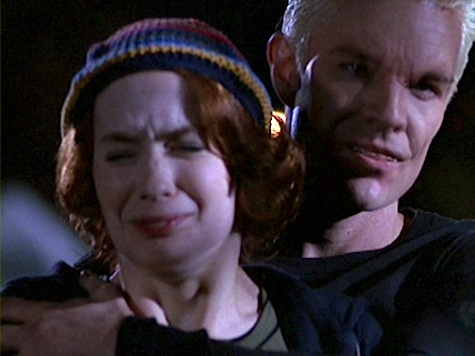
In the morning, the lecture series continues. The next unit at Slay School is entitled, “Stop giggling and listen up, kids, because you’re all gonna die.” Dawn is sitting on the basement steps, auditing the class.
According to Anya, Buffy says, the First is in remission, which simply means that killing the Turok-Han bought our good guys an episode or two of breathing space. Buffy wraps up with a long pitch to the Potentials about how they really are very special and awesome, and may well save the world. This sorta sucks for Dawnie, who isn’t chosen in any sense of the word. She takes this perceived unspecialness to heart, adding it to that thing spectral Joyce said: “Buffy won’t choose you.”
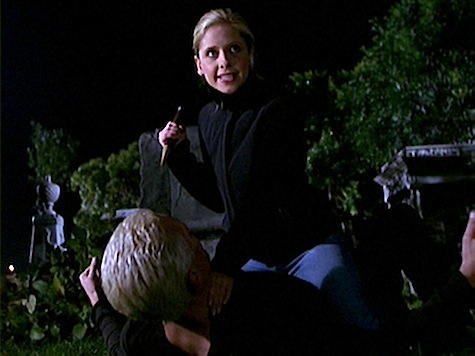
Even though on some level she must know big Sis is just trying to build confidence in the apprentices, it’s impossible not to feel a bit set down. That’s human nature.
Buffy is tragically overbooked. She zooms off to work, where Amanda, whom we’ve met before, asks her about weirdness, unpopularity, and boys. Her questions draw Buffy into a ramble about the perils of dating one’s mortal enemy, because the little encounter with Spike is still on her mind. “It’s totally over!” she insists. In fact, it’s obvious those feelings are both mellowing and getting more intense. Which is delightful for the Spuffy shippers, but it’s also less than useful for poor Amanda.
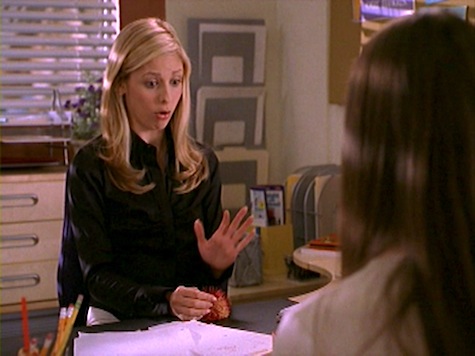
She gets home hours later to find the house disheveled, the Slayettes yelling at Xander and Andrew, and Willow a-brimming with the news that there’s another baby Slayer right here in town, a local girl that neither the First’s minions nor Team Slay have noticed.
Buffy worries briefly that this means she shouldn’t take the Slayettes out again for more training, but XandAnya and Willow say they’ll do what they can to figure out who the new Potential is. Dawn agrees that Buffy and the others have more important things to do. She then sucks up kitchen duty, while the Potentials burble over weapons and the possibility that they might actually get to kill something soon.
Andrew, meanwhile, is begging to come along on the outing. I will tell you all now that I am finding Andrew so abrasive and hard to take that I’m not gonna be spending much time on him, at least until we get to “Storyteller.” Feel free to call out your fave Andrew moments if I miss ’em. Anyway, Buffy says “Eww, no, you’re not coming.” Spike shows up, and the training party heads out. This leaves Dawn behind in the kitchen with Andrew. Any sensible person would be disheartened by that turn of events.
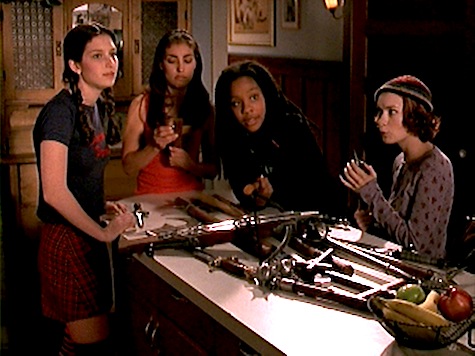
She could, one supposes, be grateful that she is no longer winning awards for “most obnoxious thing onscreen.”
Spell prep is next: Willow is organizing her components as Dawn speculates about which of her classmates is about to get Chosed.
Witchery happens. The basic point of the spell is that a shiny light will illuminate the Potential. It seems to have failed, in a sort of stenchy way, until Dawn goes to the front door to investigate a noise. Then light blasts through her—and the door, but nobody notices that. Instead Willow and XandAnya get all, “Bwee, Dawnie, you’re the Potential!”
Dawn gets flustered. Part of what she takes from this revelation is that Buffy would have to die for her to get the chosen job. Which: wrong! Faith would have to die! It’s one thing that the Slayettes don’t get it, but it’s starting to seriously annoy me that this conversation is happening in a room full of people who know that Buffy’s death called Kendra, and that the Slayer line continued through her. Have they forgotten that Buffy already died in S5? And we didn’t get an extra extra slayer from that, did we?
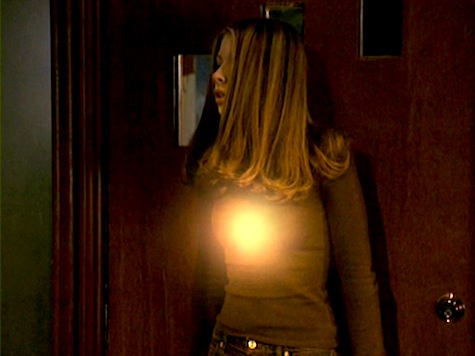
Grr!!
Anya then likens being the Slayer to being the Pope, which allows me a chance to raise something another fan mentioned to me awhile ago: the current state of things here in the real world, Popewise, mirrors the Buffy/Faith situation. After John Paul, we had a fairly upright and rule-bound pontiff—and there was allegedly only going to be one until he died and the next was called. But suddenly Pope Benedict stopped doing the job, and they got a wild and crazy Faith-style replacement.
Irrelevant tangents aside, Dawn asks for time to absorb this news, about her potential specialness, without telling Buffy. She mentions what spectral Joyce said to her, and wonders if Buffy will even be pleased to hear that she’s about to have a line on superpowers, endless combat, and an eventual painful death-by-demon.
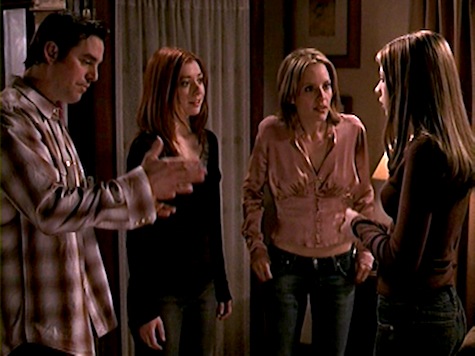
Then, as often happens in the Summers house, Dawn goes up to her room and ends up listening as the others talk about her behind her back. She’s already freaking out, so it’s extremely unhelpful. In fact, it drives her out the window and into the ever so dark streets of Sunnydale.
Buffy and Spike have, meanwhile, brought the Potentials to a demon bar. The demon bar? Is it still Willy’s place? She’s just telling them the place is full of snarly hostile types when Clem walks up and hugs her. I love Clem.
She asks him, on the sly, to give the Slayettes a scare, and he shows them something appalling. It’s something to do with his face, but we don’t see it—we just see them reacting. Badoom ching!
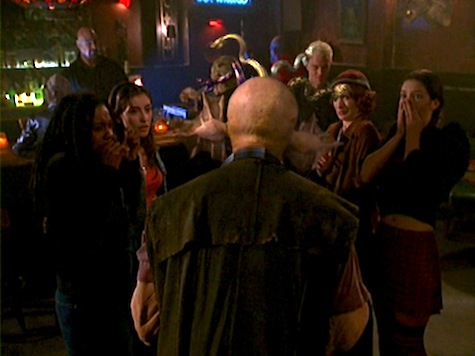
Out on the monster infested streets, Dawn has bumped into Amanda. They’re about to go their separate ways when Amanda asks if she’s okay. Dawn sees that she’s got a cut on her forehead. It turns out a vampire attacked Amanda at school, and she was thinking of asking Buffy for help.
The two of them break back into the school. They’re all nervous, and Amanda wonders if they might not let the vamp go long enough to have it attack her arch-rivals in the marching band (she’s in swing choir). The joke fails, though we give her points for attempting banter so early in her slay career. Finally, they move on to the classroom where the vampire is allegedly trapped.
They open the door and it’s not there. Or, actually, it is—it’s up on the ceiling, being hidey. The two of them flee, and Dawn nails him multiple times with a fire extinguisher, which is pretty fantastic.
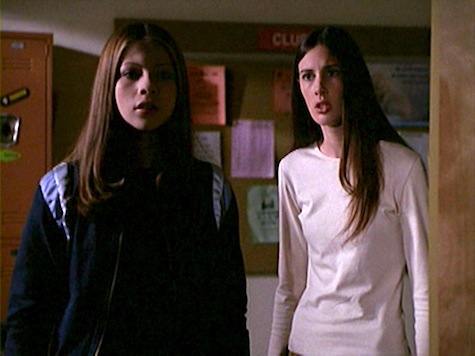
As they fight for their lives, we cut to a vampire nest with Buffy, Spike, and the Slayettes. Spike reminisces about his crypt. Lying on the floor of this particular messy place, though, is a vampire.
Amanda and Dawn have barricaded themselves into a science lab. Dawn tells her they’re going to get out of this alive. It’s a nice callback to earlier in the episode, when Buffy told the potentials to decide whether they’ll live or die.
The scene alternates between Buffy pummelling the vamp in the crypt while talking the Slayettes through the kill. Then, in time, her monologue continues as we watch a rather awesome Dawn versus vamp fight in the science lab.
When it all reaches a climax, Buffy and Spike lock the Slayettes in the crypt with one stake and the slightly softened-up vampire.
Willow and XandAnya have by now decided to talk to Dawn. You’re wayyyyyy too late, kids. Why has it never occurred to them, let alone to Buffy, that the same window she used for late-night escapes for all those years would work just fine for Dawn too?
Speaking of Dawn, she has just about lost the fight with the vamp when the Bringers show up. It’s a bit of a break, and as she’s recovering, the First’s minions grab Amanda.
Oh. She’s not as Chosen as she thought.
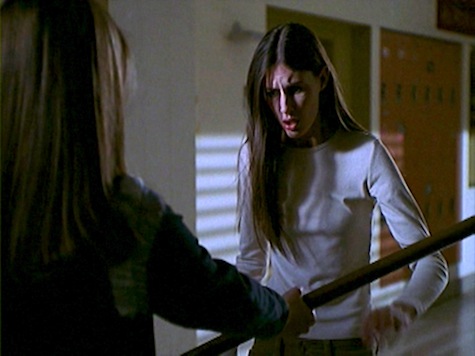
The good news is she’s already turned on the gas for one of the Bunsen burners, which makes it possible to ignite at least one of the Bringers. She and Amanda boot it out to the stairwell, where Dawn breaks the news to her. You. You’re the special one. Xander shows up in time to see Dawn handing over the stake. Buffy and the gang are a few steps behind. They help with the Bringers while Amanda dusts the vamp.
The aftermath puts the Potentials, all five of them, on the Summers couch debriefing about their respective first kills. They’re bonding with Amanda as Dawn listens to them. Buffy hauls the Potentials downstairs—after a clueless and rather cursory check-in with her sister.
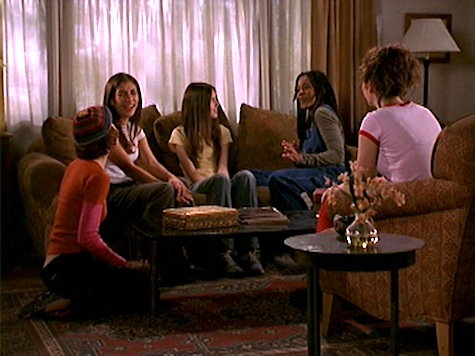
What follows is the Xander/Dawn scene that a number of you have cited as an all-time favorite BtVS moment.
Xander says that none of the powered members of the gang, not even Buffy, will know how much harder the fight is for ordinary people. He saw what she did for Amanda the night before, and he tells her it’s extraordinary.
“Maybe that’s your power,” she says. “Seeing, knowing.”
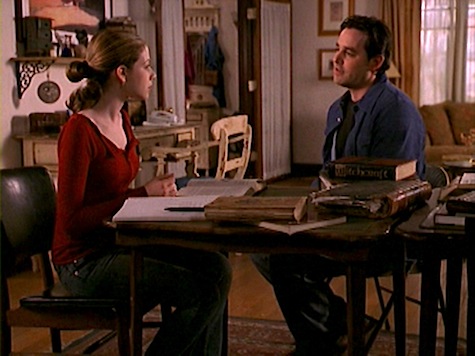
(Neither of them asks if said Xander power requires binocular vision and/or depth perception.)
It’s a beautiful moment of connection, and he leaves her feeling both teary and, somehow, more resolved. Then he goes off to do something useful but not worth filming, and she goes back to looking up things about the First.
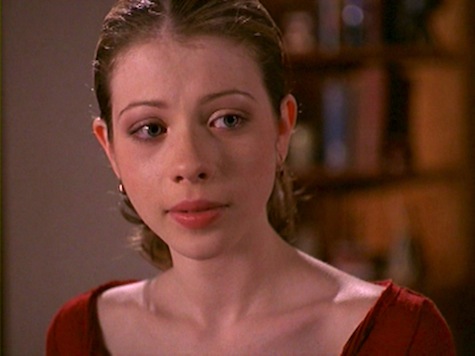
Next: Will we never be free of Warren?
A.M. Dellamonica has a book’s worth of fiction up here on Tor.com! Her ‘baby werewolf has two mommies,’ story, “The Cage,” made the Locus Recommended Reading List for 2010. There’s also “Among the Silvering Herd,” the first of a series of stories called The Gales. (Watch for the second of The Gales, “The Ugly Woman of Castello di Putti”!)
Or if you like, check out her sexy novelette, “Wild Things,” that ties into the world of her award winning novel Indigo Springs and its sequel, Blue Magic.











True that. Andrew and Kennedy have taken that position.
I realize how much I skip over in most of season 7’s episodes. Going back to high school, the baby slayers — they are NOT interesting. Wood, son of a Slayer taken out by Spike IS interesting, but high school as setting and population is so not interesting to this watcher. It feels like going backward when what we’re all wanting, all are interested in, is Buffy and Co. growing up and achieving their potentials — and how this happens, and hoping they all do stay all for one one for all all their mutual lives.
Love, C.
To again address the “Slayer line runs through who?” argument.
Willow brought Buffy back in her capacity as “warrior for the people”. That is how Osiris was beseeched. I can see that THAT, changed the Slayer line again, which is what’s causing the instabilty.
Once Buffy died the second time, no new slayer was called, because Faith already had been. But since they brought Buffy back, AS THE SLAYER, the line now runs through BOTH of them. Before Buffy’s 2nd resurrection, the line was still stable, because it only continued through Faith, though Buffy was still alive and using Slayer powers.
This is a fanwank, but I like it.
Aeryl,
If the Slayer line runs through both Buffy and Faith (Fuffy?) would that logically imply that a new Slayer wouldn’t get the Bat-signal unless BOTH of them died? Which woyuld make things both easier and harder for all concerned…
No, if Faith dies a new Slayer is called. If Buffy dies a new Slayer is called. The line has become unstable because of the ability to call two Slayers, where once, regardless of the fact that there were two living, only one would still be called. It was a minor aberration that would have corrected itself in time, so it was still stable. Now, there will always be two slayers, which is NOT SO STABLE.
It’s a tiny moment in the episode, but it always annoyed me how, at the bar, Clem greets Buffy like an old friend while Spike just stands there unacknowledged. Clem was Spike’s friend before he was Buffy’s – Buffy only met him at Spike’s kitten-poker game in “Life Serial.” I just thought it should have been “hey buddy” to Spike before it was “hay gurl” to Buffy.
Aeryl,
Your logic is impeccable but consider the dramatic implications in my scenario: the First must keep both Faith and Buffy (Fuffy?) alive to prevent a new fully functioning slayer from appearing on the scene. It would add a new dynamic—it’s always harder to win a fight when you are limited in what you can do to your opponents. From the Good Guys’ perspective it would mean that a new Slayer would not have an experienced slayer to learn from (given the exit stage left of the Watchers). Poor Giles would be the only hope of the world…
It’s interesting to think about, anyway…
Ivsxy808,
Perhaps the issue is that Clem knows Spoik from way back and has no interest in him other than playing for kittens (we hope!). Buffy is a girl. And having been a Clem myself in my youth, the unattractive guy is always going to say “hey gurl” to the cheerleader rather than focusing on his poker-pal, even though he knows that the gurl will never acknowledge his existence…
“Faith and Buffy (Fuffy?)”
Nope. “Fluffy.”
In the doldrums that I find the post-potential half of season 7 to be, this is one of the bright spots for me. It’s not really an especially good episode, but it does good things consistently.
The “instinct” speech never really felt right to me. There’s a lot about the potentials that isn’t well conceived. Have they been trained to fight, or not? I feel like I’m supposed to believe that the ones who had watchers were trained fighters, but they all seem fairly unskilled in that capacity. If you’re only a potential and have no activated Slayer… stuff… then why are your slayer “instincts” active? No. The whole “instinct” thing is such an obvious convenience. Luckily, it’s one of my few real complaints about this one.
The potentials get to stop whining about how helpless they are for an episode and act legitimately empowered for once. I cannot really even express how much of a relief that is. Dawn gets the A-story and does a nice job with it largely because it’s a Dawn A-story that shows off her maturity, for once, rather than the opposite. It’s hard to say how much of a relief that is, too. Very much.
Spike is back in action, kind of. Clem is great, and gives Buffy a moment when SMG gets to play genuine light-heartedness again. Which: relief, yes, can’t say, very much, yes. Amanda is a nice addition to the cast and brings something interesting and well-acted to the potentials, even if she’s channeling Amy Acker just a teensy bit. Xander’s heart-to-heart with Dawn at the end is lovely, if the “your power is seeing” thing kind of cheeseballs through the foreshadow wall (the season is well on its way to extracting subtlety from its scripts, with a troll hammer, so at least this one is kinda sorta subtle, kinda).
And for one of the few times at this point in the arc, the stakes are not very high–and I think the episode is much more engaging on account of it. Really, this last point I can’t stress enough. The stakes in this episode are downrighth low. It’s not “universe” problems. It’s “people” problems. It’s a small, personal episode, and one or both of those things are missing from too much of the latter half of this season.
It’s really a useful, refreshing episode.
Wiredog,
Well put. The question of whether Xander or Clem becomes the “Fluffer” is best left unexplored…
I ship it, and I call it “Fuffy”
There’s no “l” for that portmanteau.
Though they are both VERY fluffy. ;^p
Aeryl,
If one can add or drop letters, then this could be “Bath.” I’d want to see detailed documentation, though…
Great overview of a pretty good episode, Alyx.
That being said, I have to say that your analogy between the Popes and the Slayers doesn’t exactly work, because in the case of Buffy/Faith, it was the replacement who stopped doing the job, while the original dutifully kept toiling away at it.
Also, while Buffy is undoubtedly more morally upright (read: righteous hero) than Faith, she’s scarcely more rule-bound. In fact, in many ways Faith circa Season 3 was actually far closer to the traditional model of what the Slayer is supposed to be like than Buffy (if you get past the whole murdering people and working for an evil demon sorcerer thing).
The Slayer is supposed to be a lone wolf type who actively avoids what you or I might think of as ‘connections’ (Faith to a tee). And above all, as the Watchers Council would never have wanted us to forget, she is supposed to be submissive to authority, and that’s also Faith, not Buffy.
What’s that, I hear you ask. Faith, submissive to authority?! Yeah, she really is. It’s very easy to miss it because of all the attitude, but the fact is that whenever she ran into someone whose claim to authority over her she accepted (first Gwen Post, and then the Mayor), she knuckled under to them more or less completely (her submission to the Mayor was so total, that by the final episodes of S3 she admitted that she had no idea why she was killing people for him – it never even occurred to her to ask). By contrast, Buffy’s defining and arguably most radical trait as a character, from the beginning to the end of the show, has been her stubborn determination to be and remain her own agent. It’s telling that by the end of the season, Faith gets on with the big authority figures of the group – Giles and Wood – much better than Buffy does. She basically accepts the direction they want to impose on the group, whereas Buffy ultimately winds up in rebellion against it.
Faith may be the ‘wild and crazy’ Slayer, but at the end of the day she’s ultimately (and ironically) a conformist to the existing system. In the end it’s Buffy, the uptight ‘good girl’ Slayer, who turns out to be the rule-breaker who smashes it.
Not much to say about this ep either, since I pretty much agree with GarrettC. Altho’ the editorial comments did make me laugh. Thanks, Alyx. It’s a pity about Amanda. One of the potentials I/we actually cared about, so we all know what that means.
Honestly, the scene where Buffy checks on Spike’s owies doesn’t really do that much for me. A big part of this season IMO is Buffy needing to see Spike’s suffering, ‘cuz:
A) if she doesn’t see it, it doesn’t count, and
B) her own suffering seems, conversely, to make her less sympathetic to the suffering of others (i.e, No one’s suffered like I’ve suffered – see also her response to Willow’s pain after Oz leaves in s4.)
@12. Faith has no reason not to trust Gwedolyn Post in the beginning, and it’s eitirely possible her original Watcher was the first person to give her the stability and recognition she needed, which would make her death even more traumatic for Faith. The rebel stuff could be considered just acting out like a typical kid, or protecting herself, or some combination of the two. She’s still young (about Buffy’s age). Also, she had a Bad Dad (so, so rare in the Jossverse).
She wants approval and recognition, just like everyone else. She gets that from the Mayor, who’s like a father to her, and he does take advantage of her that way (the anti-Giles?).
OTOH, Buffy has a stronger sense of self, thanks to Joyce and Giles, so she’s less likely to need external validation.
It’s like Riley and Spike. Riley seems like the perfect guy for Buffy, and Spike the worst possible choice, but that’s not how it is. Spike, despite his faults, sees/appreciates the real Buffy, warts and all. We’ll see in LMPTM that his own rebel/tough guy act is, in part, a band-aid over a wound that hasn’t healed (let it go, already, yeesh!).
@13.
1) I thought that Buffy’s response to Willow after Oz left in S4 was entirely sympathetic. See the way that she stuck up for to Prof. Walsh in “The Initiative”. We didn’t see the ‘We’re all sick of it’ response until several episodes later, in “Something Blue”, by which time it wasn’t just Buffy – the entire group was fed up with Willow’s antics.
Buffy (like all that characters at various points) angsts about a lot of things from season to season, but the key thing in her case is that she almost never inflicts it on the people around her (“When She Was Bad” might be the most notable exception). She consistently prefers to bottle it up and internalize it instead. Whether that’s healthy or not is beside the point. And she’s almost never short of appropriate sympathy for her friends when they’re the ones in pain.
As for Spike, the key thing isn’t Buffy needing to see his suffering – we’ve already seen that she does, and understands it very well – it’s about the two finally learning to develop genuinely mutual trust and understanding, neither of which they’ve ever had before amidst all the twists and turns of their relationship.
The thing is, Riley also saw and appreciated the real Buffy, warts and all, and arguably understood her just as well or better than Spike did. He left her anyway because he felt that she didn’t really reciprocate his feelings, and he was probably right. Buffy/Spike ended up panning out much better because eventually Spike got what Riley never had: Buffy wanting/needing him just as much as he did her.
2) On Faith: It’s about much more than just wanting approval and reconition/external validation from a parent figure.
The big seasonal theme of S3 was Authority, and within that context it’s significant that Faith, despite her “I do/say whatever I want” attitude, was ultimately willing to completely surrender her agency. The contrast with Buffy, who ends the season unquestionably as master of her own fate, couldn’t be clearer.
Moving on to Season 7, where the most important running theme (IMO) is about power, and the ways in which having it confines/constricts as much as it liberates, the above forms a crucial bit of background to what ultimately happens: in order to win, Buffy must break the mold of what it means to be ‘the Slayer’, and she can do that because she’s already been rebelling against it ever since the first season.
3) What is it about the profusion of bad fathers in the Whedonverse that irks you so much? Yeah, it’s a bit of a trope, but it works well in most of the instances where it’s invoked, and there are easily enough positive examples of fathers/father-figures scattered across the shows to make up a counter example. There are also plenty of bad mothers, as well as good ones.
Zorra–I’m with you. Though I loved BtVS, one of the things that excited me about Firefly was that it was about grownups, and not high school students. Perhaps they should’ve built something new on the Hellmouth and found a way to shoehorn Buffy/Robin/Spike into that mix.
(What that would be, I can’t imagine.)
The point several of you make about Faith being more of a rule-followe than I said is most excellent and true. She talks the rebel talk, but you’re right, she entirely buys into the Mayor’s authority.
@15. I don’t know about an alternate setting, but an idea that did occur to me concerns an alternative Big Bad.
Instead of using the First Evil (a potentially cool idea that didn’t work out very well in execution) as the main antagonist, I think it could have been quite exciting if the last season of show had seen Buffy come into direct conflict with the Watchers Council as her final great enemy to vanquish. Although it was very satisfying to see them get blown to smithereens in an aside, after all the trouble that they caused or failed to prevent over the first six seasons of the show I feel they would have been ripe to emerge as a surprise Big Bad. I can think of a number of ways in which the themes that the writers were trying to execute in S7 could have played well or even better in such an alternative scenario. Above all, it would have made for some great opportunities to work in Wood’s past (he was raised by his mother’s Watcher), Faith’s return to the show, Giles’ ambiguous role in the season, and even the potentials, in ways that felt much more organic to the story than they actually did as played.
The other idea that leaps out at me would be to give the Coven a much bigger (and onscreen) role. Apart from generating some potentially interesting scenarios to work with, they could have been fabulous for giving Willow a character arc this season that didn’t mostly revolve around developing a relationship with Kennedy.
Alex@15,
I propose funding and construction of the Richard Wilkins III Memorial Senior Life Village and Herpetology Center, built on the site of the late Mayor’s tragic death. Surely adult-centered stories could arise here!
@14.
* I never said Buffy was entirely unsympathetic to Willow’s pain. It just struck me that there was a certain similarity btwn Buffy’s response to Willow’s suffering in s4 and Spike’s in s7. Both follow periods of intense pain for Buffy.
*It’s about power? To Faith, The Mayor is the power in Sunnydale. s3 isn’t the end of Faith’s journey, either. She’s in a much better place by the end of the series.
As for Buffy being a rebel, that’s not exactly news, now, is it? Not to mention that Giles betrays her (again) in s7, putting some distance between them. Pretty much everyone betrays Buffy at some point, to a greater or lesser extent.
Plus, This Year’s Girl and Who Are You? are fairly explicit. Faith resents Buffy and wants what she has. Faith lacks a strong support system or sense of self. Two methods of establishing/preserving the self are repeatedly mentioned in This Year’s Girl : ass-kicking and hiding.
Ass-kicking isn’t really an option for Faith, seeing as she’s being hunted by the cops, the CoW, and Buffy. Lucky for her, The Mayor’s provided her a means to hide, in Buffy’s body.
Faith, like the CoW’s goons in Who Are You?, like Spike, decided to harden herself to avoid pain and protect herself. However, Faith responds to the internal infusion of warmth she receives from Buffy’s friends and family. With it, she begins to change, just as Spike will begin to change in response to the chip and socialization.
Interestingly, it’s only after his encounter with “Buffy” in Who Are You? that Spike literally wakes up to his feelings for Buffy in Out Of My Mind.
*Riley gets a glimpse of Buffy’s darkness in Buffy vs. Dracula, but he doesn’t really understand it. He attempts to do so, but it does not go well. In AYW, he tells Buffy that the darkness can’t touch her, that she’s better than that. It isn’t exactly true, just as when Spike tells Buffy she came back wrong, it isn’t exactly false. She did come back wrong (in a sense), as we’ll see at the end of s6, when she comes back right.
The Initiative set us up to begin making comparisons between Spike and Riley. We are meant to look below the surface of the obvious characterizations of Riley as the Good Guy and Spike as the Bad Guy – or The Initiative as the Good Guys and demons as the Bad Guys.
* The Bad Dad is something of a trope? How about something of a joke? It’s like the death/resurrection trope. They’re even talking about another Scoobie death in s10 (the comix). Never mind that we almost lost Dawn last season, and Giles was killed the season before that. It’s overdone, IMO.
I see it going back to Whedon’s own Daddy Issues. He’s certainly not the first person who has turned to art to work out his issues, but he takes it pretty far. Whedon Sr. sent him to boarding school. It’s not like he turned his son out into the streets to fend for himself. He did what he thought was best for his son at a very difficult time for both of them.
@18. Dianthus –
1) On Faith – Her resentment and jealousy of Buffy’s comparatively
privileged upbringing and background are definitely a major factor in the development of her character, and for this reason “Who Are You?” does represent a major turning point, as Faith is finally forced to acknowledge that Buffy has the things that she envies – the love and respect of a mother, a mentor, a boyfriend, and friends – not because of luck but because of who she is as a person, and what she’s done to earn that love and respect. It may be at this point that she finally begins to appreciate what Willow told her in S3: after coming to Sunnydale she could have had a real shot at getting at least some of the things she wanted, but she threw all those chances away through her own bad choices.
In any case, for whatever mix of reasons, the original point stands: Faith makes pretensions of having achieved complete freedom in her own life because she refuses to follow ‘the rules’, but in fact has nothing of the sort, and is actually very submissive to the authority figures she allows to control her because she has so little agency that she’s dependent on them to give her direction. Even after she got burned by the experience with Gwen Post, it still wasn’t enough to stop her from completely giving in to the Mayor’s influence over her, so much so that he was even able to continue influencing her actions from beyond the grave. The pattern continues when she moves over onto Angel: first she had a stint of working for Wolfram & Hart, and then when she couldn’t kill Angel (or get him to kill her) she gave in to him as her new guiding influence (a positive one, this time). We then finally get to see her make a meaningful decision on her own behalf: by turning herself in to the police, and willingly going to prison to do penance for her crimes.
She’s definitely in a better place several seasons later, but it’s not a complete process either. Whereas before she was in thrall to a series of authority figures, during the episodes she appears in on the 4th season of Angel and the 7th season of Buffy she gets to have two turns at taking charge for a change, first with Angel Inc., and then as the adopted leader of the Potentials. She leans very heavily on Wesley during the former though, and during the latter her brief tenure as Leader is a disaster that almost gets most of the group killed. She ends the series feeling very much like a character who’s in the middle of an uncompleted journey – which is probably deliberate, as Whedon was reportedly planning to have her in a spin-off show that never panned out.
2) If Riley fails to adequately understand the darkness in Buffy, it’s proportionate to Spike’s failure (before S7) to understand the good in her. It’s telling that when Spike gives his speech to Buffy in “Touched” that marks the point, IMO, which shows that he really truly gets her in a way that he hadn’t even earlier in the season, what he says actually closely echoes a lot of what Riley said in “As You Were”.
3) I don’t care about the comics, or consider what happens in them to be meaningful to my interpretation of the characters and the story. I’m aware that they bear Whedon’s stamp of approval as canon, but as far as I’m concerned that’s just a good excuse to invoke Death of the Author.
I’d argue that the big difference between the recurrence in the shows of the Bad Dad and Died But Got Better tropes is that the former has a much better track record than the latter. Buffy dying and then coming back is fine because it works perfectly well on both a character and dramatic level. The other major instances are less positive: Angel’s resurrection was necessary but poorly handled, and Spike coming back was both unnecessary and cheapened the character and his prior development in many ways.
By contrast, although there’s a lot of major and minor characters who have ‘bad’ fathers, I can’t think of any instances where it didn’t work in character and story terms. Trying to tie it back to Whedon’s own issues with his father really doesn’t fly with me. Without actually crunching the numbers, I’m fairly certain that if you went through both shows and tabulated all the instances of bad fatherhood that we see, most of them would come from episodes that weren’t written by Whedon himself. Yes, he exercised great influence over story decisions as showrunner, but it seems to me much more likely to attribute the profusion of bad fathers to the fact that parents and parent-figures in general tend to get a fairly bad rap in stories like these – it’s a standard way of generating character drama and angst. As I said above, you could comb through the shows and find plenty of instances of fathers who were good, and mothers who were bad. Just as the great majority of characters who die on the shows stay dead – regardless of the jokes about their tendancy to come back.
@alex C. You just blew my mind with your analysis of Faith and Buffy and their relationships with authority! It seems so obvious after reading your thoughts about Faith in particular, thatfor all her bravado, it is actually she who represents and follows the traditional slayer mold and path, while Buffy, although she very much feels the desire to be a traditional “good girl” in a lot of ways while growing into herself and her slayerness, is actually the one constantly breaking with the traditions of the patriarchy both of the WC variety and in wider society respectively. Fabulous analysis of Faith and S3, you actually have made me want to go back and watch the season just to track the girls and how they deal with the Mayor and authority respectively (and S3 is my least watched season for a number of different reasons) for myself! To quote a certain vamp, this is just neat!
It’s always a pleasure for me to read your analysis and thoughts on episodes.I look forward to your comments as much as I look forward to reading Alyx’s recaps/analyses which are also fab.
I enjoy this episode on re watch just fine but I’m very easy and sweet on S7, so I’ve got quite a bit of bias going on there. I do agree with Alyx and Zorra above, that I don’t find shows set in high school settings very appealing. So while I can appreciate the “back to basics” theme that’s also going on with the visual and spoken shout outs to the early, high school- is-hell-years of the show, the reason I absolutely love BtVS is because of the later seasons: 4-7. So, cutting back on the teenagers and high school stuff that got introduced this season might have been really nice now that I’m giving it thought…
@20. Ashley M. –
Thank you very much for the compliments. :)